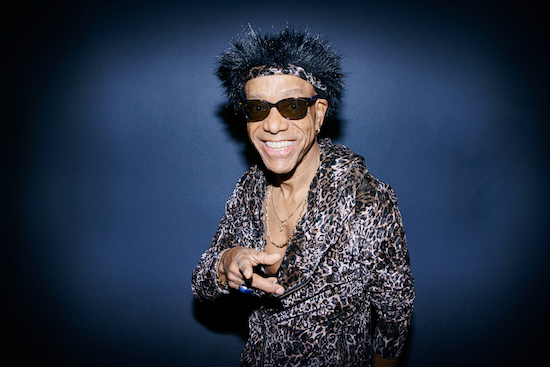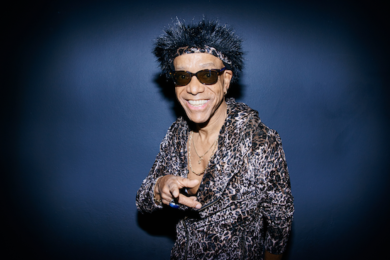Photo by Sophie Valentin
For Idris Ackamoor, his new album with The Pyramids Afro Futuristic Dreams is a further expansion of his vision. Part of a continuous stream. “I am very much in the present, I try to look forward to the future, and the past is something I relish,” he tells tQ. “My memories are wonderful, growing up in Chicago, to the work The Pyramids did in the seventies, it is all ingrained in my mind, but that’s not what I live for. Those memories are part of who I am, but I feel like the most important composition for me is the next composition.”
This new record, he says, "Is a departure from anything I have ever done before, from the seventies through to the last three albums where I was mostly working with sextets or septets. Now I am jamming with a seven-piece band, [and] this album has been expanded with a string quartet and additional horn players. This has allowed me to be reborn. It has become Afro Future, my calling card for the work I want to continue to do with larger ensembles. It was also conceived during one of the worst crises in recent memory – the pandemic, and I had to dig deep into my compositional palette, which was influenced by that isolation but was also celebratory of being able to survive.”
Ackamoor’s role has often been about witnessing and providing commentary, which underpins this new work. “On many of the compositions, like ‘Police Dem’, I am paying homage to what we were going through with George Floyd’s death and the police state here in America,” he says. “It’s a nod to Fela Kuti and his track ‘Zombie’. Other pieces like ‘Afro Futuristic Dreams’ or ‘Nice It Up’ are about my love of creating rhymical foundations and soaring over time. ‘Requiem For The Ancestors’ could have been done in any year, as it is about embracing our ancestors, including my great grandfather Jim Kelly from Ireland. It’s all part of my artistic palette, composition and creativity.”
Ackamoor’s Pyramids were born out of a study programme in 1972 that took him from Antioch College in Yellow Springs, Ohio, to Paris, to Amsterdam, and then to Africa. “My musical life revolves around that greatest period in my life, and the basis for that incredible odyssey and journey is still with me today,” Ackamoor continues. “The use of music in African culture has unified communities, the barrier between performer and audience is invisible, so when we play, we go through the audience trying to create a community with the people actually there, and we have honoured that for 50 years. It’s part of my foundation and spiritual life. I am the griot American. The griot is a chronicler of African society and traditions and religions, he is that magical shaman that is not only a musician but a storyteller, a dancer, a mover. I incorporate all of that into my life as an artistic being. Community is at the fore of my music, and the centre of my musical philosophy and spiritual being.”
Ackamoor’s Baker’s Dozen roots us in the company of some of his personal heroes, but it also roots us in many of the preoccupations that are as apposite today, albeit in a slightly different shape. “My granddaughter is five years old – I have to think that we are in a better situation, this isn’t the 50s or 60s. I lived through the civil rights movement, I am a child of the civil rights struggle, my mother was very inspirational and dedicated to that struggle, unintentionally. She was an elementary schoolteacher and taught third and fourth grade and was pulled into the struggle through a desire for equal treatment for people. I remember the struggles she went through for her views, so that it is something my granddaughter does not have to live through. We are light years from when I was growing up in Chicago, but we can never forget. Just a while ago we witnessed the death of George Floyd at the hands of the police, but we also witnessed the hope of that young girl, standing there, filming with no fear, so that is the hope I have for the next generation.”
Idris Ackamoor And The Pyramids’ new album Afro Futuristic Dreams is released on 22 September via Strut. To begin reading his Baker’s Dozen, click the image of him below.



